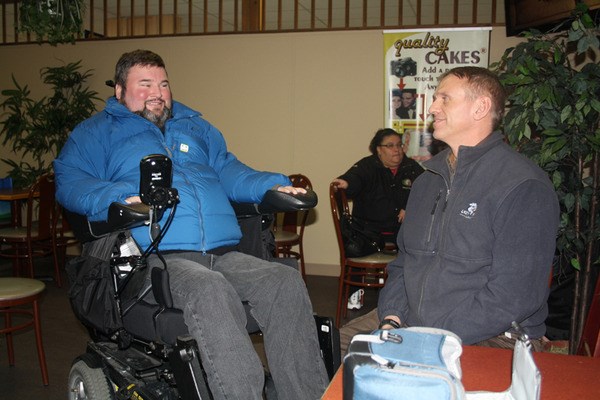Steven Fletcher, federal minister of state for democratic reform and a Winnipeg-area Conservative MP, was in Thompson last week, meeting with various community groups and interests.
"I'm doing all this for pre-budget consultations for the federal government," explained Fletcher. "We have a budget coming down in March, and we want to get the views of Canadians from coast to coast on what they would like to see in the budget." Fletcher's stay in Thompson lasted from Jan. 16-18, and included a meet-and-greet with himself and local Conservative candidate Wally Daudrich as well as meetings with the city, United Steelworkers Local 6166, local Vale management, the Thompson Chamber of Commerce, the Burntwood Regional Health Authority, and First Nations groups.
"We had very productive meetings with stakeholders from the union, the city, service providers, and even new industries like the all-weather testing facility," he said. "We also went for a service tour of the mine site. We've been very busy."
Fletcher described the people he spoke to at the meet-and-greet as "upset, angry, and motivated to get rid of Niki Ashton. A lot of people showed up to support Wally. There was a real enthusiasm for a change as far as people are not happy with Niki Ashton and the hypocrisy that the NDP federally espouse on the people of Churchill. What I heard is that they wanted someone to go to Ottawa that will be friendly to the development of the industries of the North, and not be irresponsible as the NDP has been. They also want somebody who will talk to government. Niki Ashton has not once talked to any of the members of Parliament who are on the government's side about any of the issues important to Churchill. Wally has done that many times."
Fletcher pointed to two specific bills - Bill C-311 and Bill C-300 - saying that in both cases, Ashton voted against the best interests of the Churchill riding.
Known as the Climate Change Accountability Act, Bill C-311 was first introduced by NDP leader Jack Layton, and passed the House of Commons in 2010 only to be defeated in the Senate. It would have required the federal government to bring greenhouse gas emissions at least 25 per cent below 1990 levels by 2020, and 80 per cent below 1990 levels by 2050. "Bill C-311 was a bill that was a form of environmental extremism that would have caused havoc in resource extraction industries across Canada, including the oil sands and mineral extraction," said Fletcher. "The NDP and Liberals supported this, and that of course is not in the interests of Thompson."
"Bill C-300 would have led to Canadian mining companies moving out of Canada because of overbearing regulatory requirements overseas," he continued. "That's not in Canada's interest either. People were frustrated that a Member of Parliament from Thompson, the riding of Churchill, would espouse policies that would destroy the economy of the North. People were really, really disappointed in Niki Ashton and the federal NDP." Bill C-300, introduced by Liberal MP John McKay, would have given the government authority to withhold public money from resources companies found to have acted improperly in other parts of the world, which mining companies claimed could lead to an exodus of resource companies from the country.
Fletcher is also the minister of state for democratic reform, a position he has held since 2008. While issues of democratic reform typically do not hog the media spotlight, Fletcher was eager to explain what that job entails. "We're working on ways to improve the engagement of Canadians in the democratic process," he said. "The main issues revolve around the seat distribution in the House of Commons - we want to ensure that faster-growing provinces are properly represented in the House of Commons - senate reform, meaning senate term limits as well as an elected senate, campaign finance reform to ensure that Canadian tax dollars are used effectively and that we don't have big money influencing politics in Canada, expanding opportunities for people to vote by expanding the number of days, instead of one day, increasing it for two days for people to vote."
Seat distribution has been the subject of a Parliamentary bill which passed first reading last April, but has largely languished since then. "What we've done is brought forward a formula, based on population, to ensure that faster-growing provinces like Alberta, Ontario, and B.C., are represented based on population in the House while not affecting the seat counts of provinces like Manitoba," explained Fletcher. "That's fair, and I think most Canadians appreciate that."
"It's unfair that there are some Toronto ridings that have 150,000 people - that's more people than the province of Prince Edward Island, and they have four seats," he added.




